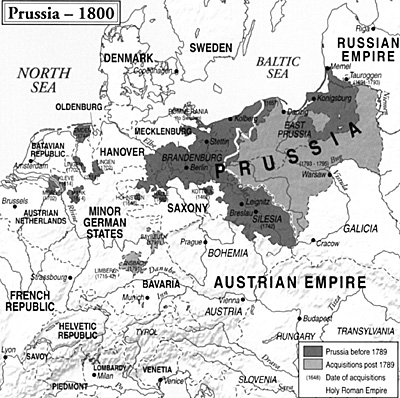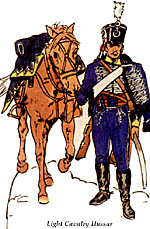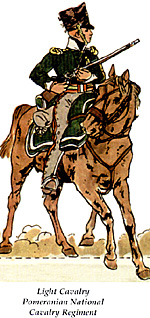
At the start of the Revolutionary Wars Frederick William III's Prussia still basked in the military glory won by his father, Frederick II, "the Great" (reigned 1740-1786). Having emerged from the Seven Years' War (1756-1763) as the continent's chief military power, the subsequent partitions of Poland in 1772, 1793, and 1795 helped increase greater Prussia by some 9 million people. Prussian interests lay primarily to the east, and it viewed Austria as its chief competitor.
Although it joined the First Coalition against France, Prussia withdrew in 1795, making a separate peace by the Treaty of Basel, abandoning territories along the Rhine. Frederick William III (1797-1840) refused to join the Third Coalition or to aid Austria in 1805, only to join the Fourth Coalition in 1806.
Napoleon, however, struck first in a lightning campaign before Russia could join Prussia's vaunted army. Prussia's antiquated military proved to be no match at Jena and Auerstadt for Napoleon's new Grande Armee, now at the height of its hard-earned glory. Crushed militarily, Prussia concluded a humiliating peace in 1807.
By the Treaty of Tilsit it ceded all lands west of the Elbe River and most of its share of Poland, thereby losing nearly half of its population.

 From this low point, Prussia rebuilt itself through the exertions of such able and energetic reformers as Karl vom und zum Stein, Karl August von Hardenberg, and Wilhelm von Humbolt. These men helped transform Prussia into a more progressive state by abolishing serfdom and noble privileges, introducing agrarian and other social and economic reforms, and laying the groundwork for an exemplary system of universal education. Meanwhile, Gerhard von Scharnhorst and August Graf von Gneisenau reformed and modernized the Prussian army.
From this low point, Prussia rebuilt itself through the exertions of such able and energetic reformers as Karl vom und zum Stein, Karl August von Hardenberg, and Wilhelm von Humbolt. These men helped transform Prussia into a more progressive state by abolishing serfdom and noble privileges, introducing agrarian and other social and economic reforms, and laying the groundwork for an exemplary system of universal education. Meanwhile, Gerhard von Scharnhorst and August Graf von Gneisenau reformed and modernized the Prussian army.
Although forced to send auxiliary support to assist Napoleon's invasion of Russia in 1812, a large contingent changed sides in December as the Grande Armee disintegrated during its winter retreat. In spite of Frederick William III's initial reluctance, Prussia joined the allies of the Sixth Coalition. Nascent German nationalism blossomed in 1813, providing the manpower for an enormous Prussian military expansion. Under Field Marshal Blucher, Prussian arms made a significant contribution in the campaigns of 1813-1814 and Napoleon's eventual overthrow, and played a crucial role in his final defeat at Waterloo in 1815.
More Powers of the Napoleonic Era
- France
Great Britain
Duke of Wellington Profile
Austria
Archduke Charles Profile
Russia
Field Marshal Kutusov Profile
Prussia
Field Marshal Blucher Profile
Spain
The Peninsula War
Ottoman Empire
Minor Powers
Back to Table of Contents -- Napoleon #17
Back to Napoleon List of Issues
Back to MagWeb Master Magazine List
© Copyright 2001 by Napoleon LLC.
This article appears in MagWeb (Magazine Web) on the Internet World Wide Web.
The full text and graphics from other military history magazines and gaming magazines are available at http://www.magweb.com
Order Napoleon magazine direct